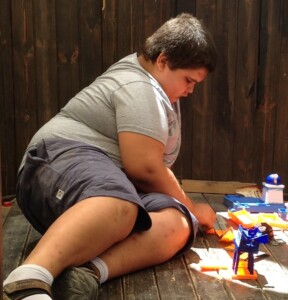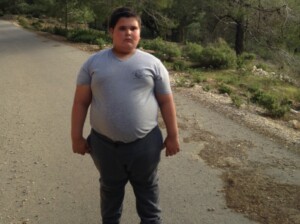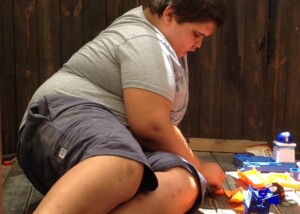
Obesity in children is dangerous, period. But just how dangerous?
Kids, quite simply, should never be fat. Body positivity will NOT subdue the harmful effects of overweight. Never.
Instead of preaching body positivity to your obese child (or what you might refer to as “pleasingly plump”), you might want to consider encouraging (not shaming) your child to embrace physical activity, structured exercise and sports participation.
You should not be okay with your child being overweight any more than you’d be okay with him or her smoking.
Though smoking is illegal in minors, and obesity is not — that’s not the point, is it?
The Dangers of Obesity in Children

“Infants and toddlers naturally have a cute, pudgy appearance that tends to resolve as they grow,” begins Dr. Lisa Lewis, MD, a board certified pediatrician in Fort Worth, Texas, and author of “Feed the Baby Hummus, Pediatrician-Backed Secrets from Cultures Around the World.”
“Health care providers are able to calculate a BMI which will detect if a child, at any age, is overweight.”
BMI is body mass index, and for kids, it’s a very good indicator of the presence of excess body fat.
In adults who have a lot of muscle, BMI is less accurate at indicating high levels of body fat.
“Children in the obese range are at risk of serious illness as they grow,” continues Dr. Lewis.
“Unfortunately, obese children are commonly discriminated against by their peers. Fat shaming is taboo in our society, but still exists on many levels in our society.
“Obese children are more likely to get an injury, type 2 diabetes, hypertension and suffer from depression.
“Research shows that obese children are more likely to be obese adults.
“Obesity moving into adulthood increases the risk of heart disease, hypertension, type 2 diabetes, cancer and numerous other diseases.”
Fat Kids Climbing “the Rope” in Gym Class While Thin Kids Watch
This is the stuff of movies and TV shows.
In real life, moms should think less about encouraging their chubby young daughters to flaunt a bikini, and more about taking her on hikes and encouraging, for instance, inline skating or martial arts.
What can medical professionals do?
The U.S. Preventive Services Task Force is recommending that medical professionals screen for childhood obesity in patients six and over.
The USPSTF also recommends that clinicians refer such patients to behavioral intervention programs for weight loss.
Obese Children in America
• About 17 percent of kids two to 19 are obese as of 2017; but the percentage is rising.
• About 32 percent are overweight though not clinically obese. Again, as years go by, the percentage rises.
• However, those who are not obese but are overweight should be considered at high risk of transitioning to the obese level.
Very overweight children are at high risk for:
• Mental health issues (which are not caused by “fatphobia”)
• Obstructive sleep apnea (which can cause ADHD-mimicking symptoms)
• Asthma
• Orthopedic problems
• Poor cholesterol profile
• High blood pressure
• Type 2 diabetes or prediabetes
• Social exclusion or bullying
That’s a pretty ominous list. Even if, in rare cases, teaching body positivity somehow circumvents social exclusion, bullying and mental health issues, it will have no effect on warding off the physical dangers of obesity.
The USPSTF recommends using body mass index (BMI) as a detection tool, since some parents may underestimate just how overweight their child is.
The full report is in a June 2017 issue of JAMA.
Message for Parents of Overweight Child: Look to the Future
The vast majority of morbidly obese adults were obese or moderately overweight during childhood.
Never assume that your child will “outgrow” obesity via natural biological processes.
The dynamic that’s led to the excess body fat needs to be changed.
This begins with clearing the cupboards, pantry and refrigerator of useless junk food and replacing with healthful food, and keeping plenty of fruit on hand for snacks.
“But Mom I’m hungry!”
Bare in mind that if your child is not hungry enough for an apple or peach, then they’re not hungry enough for a donut or ice cream bar.
- Instead of buying your pudgy young daughter another bikini for the next body positivity lesson, buy her a basketball or a badminton raquet and birdie.
Having 25+ years’ experience, Dr. Lewis completed her pediatrics residency at Texas A&M University Health Science Center, Scott and White Memorial Hospital. For two years afterward she was assistant professor in the department of pediatrics at Texas A&M University Health Science Center.
 Lorra Garrick has been covering medical, fitness and cybersecurity topics for many years, having written thousands of articles for print magazines and websites, including as a ghostwriter. She’s also a former ACE-certified personal trainer.
Lorra Garrick has been covering medical, fitness and cybersecurity topics for many years, having written thousands of articles for print magazines and websites, including as a ghostwriter. She’s also a former ACE-certified personal trainer.
.







































